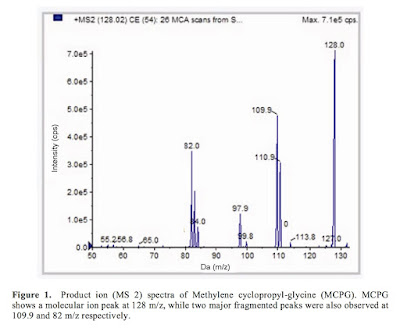 |
| http://www.thelancet.com/pdfs/journals/langlo/PIIS2214-109X(17)30035-9.pdf |
Mortality was observed to be significantly high in malnourished children who skipped their evening meals. The normal stores of glycogen in liver is sufficient for short term energy needs in normal healthy children, which is followed by oxidation of fatty acids in an event when glycogen stores are depleted. Now, in malnourished children this step is short-circuited with direct activation of fatty acid oxidation, in the absence of glycogen. Two naturally occurring molecules in litchi, hypoglycin A and methylenecyclopropylglycine (MPCG) , are known to disrupt fatty acid metabolism, which in turn greatly reduce the glucose levels in the bloodstream. The poor supply of glucose further caused irreversible damage to brain, followed by seizures and unconsciousness.
 |
| http://www.currentscience.ac.in/Volumes/109/12/2195.pdf |
Hypoglycin A has been earlier linked to hypoglycaemic encephalopathy in Jamaica. It is abundantly present in ackee fruit, which is from the same soapberry family as litchi. Both these molecules have been known to induce similar symptoms in animal studies.
Most of the deaths in India were reported in families of litchi harvesting labourers. As the Current science correspondence revealed, the singular fruits dropping on the ground were left for consumption by children as litchi is mostly sold in bunches. The heavy intake of fruit along with skipping of evening meal worsened the situation. Public education and simple intervention steps as healthy cooked evening meal and infusion of dextrose in case children are rushed to the hospital is already saving many lives.




No comments:
Post a Comment